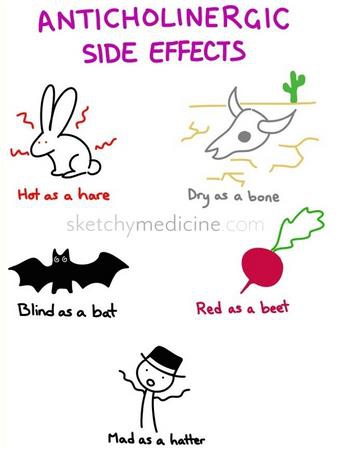The drugs that contain anticholinergic substance are called anticholinergic drugs. This substance is used to close the neurotransmitter acetylcholine in the nervous system including both peripheral and central nervous system. It works by blocking the neurotransmitter from combining with the receptor in nerve cell, by restricting parasympathetic nerve impulses. These nerve fibers are involved in movement of smooth muscles in different regions in the body, e.g., lungs, gastrointestinal and urinary tracts, etc.
Anticholinergic drugs are classified in three categories based on their targets in the nervous system. Some researchers have shown that its persistent use can cause some mental disorders. Despite, this it is very widely used drugs for asthma, chronic obstructive pulmonary disease or COPD and digestive and urinary tract diseases. The anticholinergic drugs list is long. However, here are a few things that you must know about these drugs.
6 Things to Know About Anticholinergic Drugs
When These Drugs Are Used?
Anticholinergic drugs are used in the following conditions: disorders related to gastrointestinal tracts such as gastritis, diverticulitis, diarrhea, ulcerative colitis, vomiting and nausea. Disorder related to genitourinary tract such as urethritis, prostatitis and cystitis are treated with these drugs. It also helps in respiratory diseases such as asthma, chronic bronchitis and COPD or Chronic Obstructive Pulmonary Disease.
For treatment of Insomnia small quantity is used for short duration. It is also used in Sinus bradycardia caused by vagus nerve. Orientation disorders such as motion sickness, vertigo and dizziness are also treated with it. It is also useful in surgeries as it induce sedation and antisialagogue effect. To get more comprehensive anticholinergic drugs list visit medication list websites.
What Are Its Side Effects?
Although very useful for many disorders and top the medication list, they have fair share of side effect. As the anticholinergic drugs list and its side effects are quite long, we’ll briefly mention some of the main side effects. If you are using this medicine and observe other side effects, consult the doctor immediately. Some studies shows anticholinergic drugs are associated with increased risk of Dementia, lack of coordination or Ataxia, dry mouth, dilated pupils, high body temperature and other mental disorders.
As the drug deals with the nervous system it may induce symptoms similar to delirium such as hallucination, confusion, dizziness, lack of orientation, problem in remembering, Euphoria, inconsistent speech, disturbance in vision and similar problems etc. Patient should tell the physicians if they encounter any side effect.
They May Cause Dementia
Over many studies, it is proved now that anticholinergic drugs are linked to Dementia in older adults. It is usually present in the medicines such as over the counter drugs for problems such as Insomnia, allergy, depression and overactive bladder. Mostly, over dose or long use is related to the disease.
Now, scientists have found that even if cholinergic drugs are taken in low quantity but over a long period of time, it can cause the problem. Many people know that it causes dizziness or visual disorders. Even the doctors are unaware are of the fact that it is related to cognitive impairment. One must use this with caution and ask the doctor about any side effect you notice. Generally one must get all the medication information before using any medicine.
They Are Effective In Bladder Problems
Anticholinergic drugs are effective in disease such as overactive bladder. Some of these may have some side effects, but all in all these are useful for such problems. In this case, oxybutynin is the most widely used drug. The cholinergic drugs are efficient, economical and safe. Some of the drug types change with the patient's age and sex. The affectivity of the drug increases with the aid of bladder training. Bladder problems are very common in the elderly people. Thousands of people who suffer from prostate glands problem are also prescribed anticholinergic drugs in their medication list.
Anticholinergic and Sundowners Syndrome
Anticholinergic drugs may cause a situation which is called anticholinergic syndrome or anticholinergic toxicity. It is curable problem. Shift the patient to the hospital or clinic immediately. The main symptoms are seizures, vomiting, diarrhea, lacrimation, weakness in muscles, problems in breathing, etc. The main focus of the doctors is to bring the respiratory, circulatory and neurological condition back to the normal. It is an emergency situation, so immediate actions are taken by the doctors.
One more thing to know which is linked with this syndrome is sundowners syndrome. The Alzheimer's disease and Dementia patients usually suffer from this problem too. The sufferer gets confused and agitated after the sun goes down and during night.
Some of the precautionary methods are: restriction of caffeine and sugar intake to the morning hours, having light meal at night, exposure in bright light, and pain management with medication are used for sundowners syndrome.
Who Are Not Fit to Use Anticholinergics?
Anticholinergics drugs are not suitable for older adults. They are more prone to their side effects than young people. The elderly are more susceptible to confusion, impairment in cognitive functions and memory problems. Similarly, people with enlarged thyroid and prostate glands should not use cholinergic drugs, too. Besides them, people with these symptoms should also avoid it: glaucoma, tachycardia, problem in urination, liver problem, heart failure, etc. Similarly, people with allergy to anticholinergics should tell that their doctors about any of the above mentioned symptoms or any similar symptoms.
Some very useful medication information! A thing to look for the people who are using these drugs is that it decreases perspiration. The decreased perspiration may increase the body temperature. During exercise, make sure that you don’t get overheated. The decreased perspiration in this case may cause heat stroke. Similar care must be taken when bathing. In summers, also look out that you don’t get too much heat.
Conclusion
Anticholinergic drugs are a group of drugs that work by inhibiting acetylcholine in the nervous system to bind with the nerve cell. This results in restriction of involuntary muscle movement of softer muscles of gastroenteritis, urinary tracts and lungs. Anticholinergics are useful drugs that are found in wide variety of medicines for myriad of health problems. These are also found in over the counter medicines for problems like insomnia, allergy, asthma etc. The long and over use of anticholinergic drugs is associated with many mental and physical disorders. Recent studies have shown that it is linked to higher risks of dementia in elderly.
Another phenomenon related with the use of these drugs is the anticholinergic toxicity and sundowner syndrome. In this case, the patient should be taken to the hospital immediately. For sundowners syndrome, make appropriate changes in diet and sleeping habits to reduce insomnia and agitation. Elderly and people with some other disorders should not use these drugs. Some precautions must be taken by the people who are using this medication. This drug is very useful with some setbacks. Know all the medication information. You may use it only when prescribed.








View All Comments /Add Comment